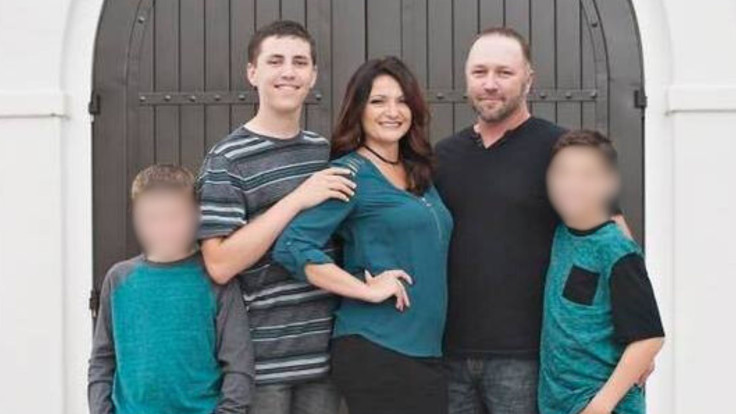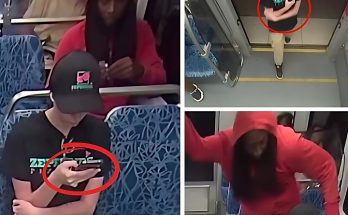“I NEVER IMAGINED IT COULD BE HIM”: A FATHER’S SHATTERED WORLD AFTER CHARLIE KIRK’S ASSASSINATION
“It’s Tyler… it’s Tyler. I don’t know what to do,” Matt Robinson whispered into the phone, voice trembling so violently that his wife Amber could barely make sense of the words. The moment had arrived that no parent ever expects—he had discovered, with crushing disbelief, that his own son, Tyler Robinson, had been identified as the suspect in the assassination of Charlie Kirk, the 31-year-old conservative activist and founder of Turning Point USA.


The quiet suburban home in Arizona instantly became the epicenter of a father’s unbearable grief, disbelief, and horror.
Matt’s voice shakes as he recounts the hours that led to the revelation. “I stared at the photo released by the FBI… my stomach dropped, my chest tightened… and then it hit me: my son. MY son did this. I couldn’t breathe. I couldn’t… I couldn’t process it. He… he actually did it.” Amber, clutching her robe as she rocked back and forth, nodded silently, the words lodged in her throat. Social media, news feeds, and live coverage had already begun flooding the nation, but inside the Robinson household, the world had narrowed to a single, unbearable truth: Tyler, the boy they had raised, had crossed a line from which there was no return.

Tyler, 22, had always been different. A quiet, solitary child, he spent hours in his room, lost in online games, historical research, and meticulous sketches of maps and locations that initially seemed like harmless hobbies. His parents often called him “thoughtful” and “intense,” yet increasingly, whispers of darkness began to seep into those solitary hours. He muttered about corruption, about people who needed to be stopped. “We were worried, sure,” Matt confesses. “But never in a million years did we think he could take a life… let alone plan something like this.”
As the father recounted his encounter with the FBI and his confrontation with Tyler, it was clear that the psychological fracture in this family was profound. “When he opened the door,” Matt recalls, “there was a calm in his eyes that chilled me to the bone… detached, almost like I was looking at a stranger wearing my son’s face. He said, ‘I know. I can’t go back. I’m already too far in.’ And I… I held his shoulders, tears streaming down my face, and begged him… begged him to stop.”
Audiences across the nation have expressed shock and disbelief at the unimaginable domestic drama behind the headlines. On Twitter, one user wrote, “I can’t even imagine looking at my child and realizing they did something this… horrifying. The horror for the parents is unimaginable.” Another commented, “We only ever hear about victims and perpetrators, but rarely the families behind the shooter. Heartbreaking.” In a surreal twist, the nation’s attention turned from the crime itself to the intimate, agonizing struggle of the parents grappling with the human tragedy within their own home.
The Robinsons described Tyler’s room as a labyrinth of notebooks, online printouts, and sketches, all detailing a meticulous planning process that seemed at once obsessive and disturbingly precise. Hours spent tinkering with firearms, cataloging weaponry, and murmuring dark theories about the world’s decay had gone unnoticed—or dismissed as adolescent eccentricity. “It’s terrifying,” Amber whispers. “We saw the signs… we thought we could guide him, warn him, love him into a better place. We never imagined it could escalate to this.”
Even after Tyler’s surrender—peaceful, guided by a youth minister who doubled as a U.S. Marshals task force officer—the weight of the tragedy did not lift. “I held him and I begged him, ‘Son, it’s not too late…’ but the images, the video of Charlie falling, the chaos, the fear—those are forever burned into my mind,” Matt admits. “I love him, and I hate him, and I cannot reconcile it. How did my son become someone capable of such cold violence?”

Fans and followers of Charlie Kirk have been equally stunned, not just by the political implications but by the raw human horror of this story. On social media, one comment read, “This is the kind of thing nightmares are made of. A kid from a normal neighborhood… turning into a headline. Heartbreaking.” Another wrote, “Parents must feel like their world has been ripped apart. I can’t even imagine the guilt and heartbreak.” The juxtaposition of a promising life, a child once beloved, and the sudden slide into notoriety and violence has captured the attention of millions across the country.
Experts in psychology and criminal behavior have weighed in, pointing out the chilling pattern of withdrawal, obsession, and ideological radicalization that Tyler displayed in the months leading up to the attack. Friends and acquaintances described him as increasingly isolated, yet strangely meticulous. “This was not sudden,” one observer noted. “This was the culmination of long-standing warning signs—combined with a dangerous ideology and access to lethal means.”
In the public sphere, debates rage over policy, gun control, and online radicalization, yet the Robinsons’ personal ordeal serves as a reminder of the human cost. Matt and Amber Robinson now live in a liminal space of guilt, heartbreak, and hope—for themselves, their family, and perhaps a son they fear they will never truly recognize again. “We replay the moments, the conversations… the birthdays, the little jokes, the quiet evenings. We see the boy he was, and then we see the monster he became. It’s unbearable,” Matt admits, voice breaking under the weight of memory.

The nation reacts: viewers and commentators alike have noted the tragic duality of this story. “We see the shooter as evil, but there is humanity in the parents’ grief,” one comment read. Another wrote, “This is a tragedy beyond politics. It’s a family destroyed, and it should make all of us reflect on warning signs and communication.” Across online forums and discussion boards, the Robinsons’ story has become a case study in empathy, the complexity of radicalization, and the inconceivable pain inflicted on those closest to the perpetrator.
The story of Tyler Robinson and his parents is a chilling illustration of how ideology, obsession, and unheeded warning signs can converge into tragedy. And yet, it is also a testament to love and moral courage: Matt Robinson’s insistence on confronting his son, attempting to prevent further harm, shows a parent grappling with impossible choices. “I may have saved lives that night,” he says, “but I cannot save my own heart from breaking.”
Audience reactions continue to pour in, each adding layers of empathy, sorrow, and reflection. “Imagine the heartbreak… to love your child and watch them become something terrifying,” one person wrote. Another shared, “This is the real story behind the headlines—the human side, the parents, the heartbreak. America needs to see this.”
In the end, the Robinson family stands as a fractured emblem of a larger crisis: the fragility of human connection, the dangerous intersections of ideology and obsession, and the unfathomable grief that accompanies realizing someone you love has become capable of unthinkable acts. “We will never stop loving him,” Amber says softly, tears streaming down her face, “but we will also never stop mourning the world that he destroyed in those moments.”
As the nation continues to process Charlie Kirk’s assassination, Tyler Robinson’s parents remain a haunting reminder that behind every headline, every viral video, every news cycle, there are human lives irrevocably altered. Matt and Amber Robinson’s voices echo across the country, a call to empathy, reflection, and vigilance: even in our most private tragedies, the consequences ripple outward, touching every corner of society.




